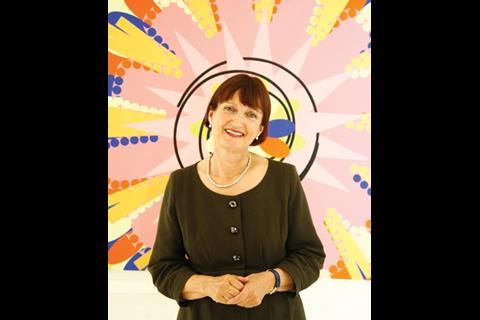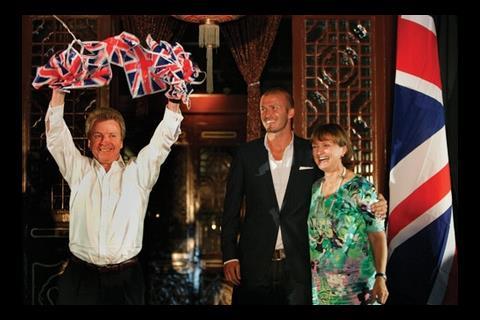Olympics minister Tessa Jowell may be catching much of the flak being fired at the preparations for the 2012 London Games, but it’ll take a lot more than that to faze her. Dan Stewart reports
Tessa Jowell probably won’t read this interview. The Olympics minister seems to know what the press will write anyway. “There are three headlines we will see between now and the opening ceremony,” she says. “One is that the budget’s out of control, the second is that the venues are late and the third is that everyone involved in the project is useless. Well, it isn’t, they aren’t and first-class people are working on it.”
Strong words indeed, but sitting in her rooms in the Cabinet Office, Jowell seems more genteel than some of her colleagues. Like most senior politicians, she is well briefed, but she appears to have a genuine enthusiasm for her job, which helps combat the negativity surrounding the Olympics.
“When you’re involved in such a wonderful project, you put on a fire-proof jacket and get on with it,” she says, breezily. “The media is free to write what it wants, but the chances are I won’t read it. Why bother?”
Jowell came to prominence in the New Labour Cabinet of 1997. An original “Blair’s babe”, she was health minister and culture minister during the party’s first two terms. After Gordon Brown took charge last year, Jowell became Olympics minister – a crucial position, she would say, but some see it as an attempt to marginalise a key ally of the former prime minister who once said she would “jump under a bus” for Blair.
Games people play
These days, Jowell is all about the Olympics. When we meet, she is preparing to go to Beijing for the Paralympic Games’ closing ceremony. China spent £25bn on its Games – more than twice London’s own budget of £9.3bn. One may have expected this daunting scale to have increased the pressure on Jowell, but she says London should not try to compete. “London’s purpose in hosting the Games is different,” she says. “When the time comes it will be just as exhilarating.”
The media can write what it wants, but the chances are I won’t read it
Though she may be able to ignore negative press coverage, there is no escaping the fact it is not just the media that has been criticising the preparations for 2012. The parliamentary committees monitoring the Games’ progress have issued critical reports, too. In April, a department for culture select committee said the “Games’ organisers were prepared to spend money like water”. In the same week, the Public Accounts Committee (PAC) said the original budget of £4bn was “unrealistic” and accused the government of being “economical with the truth”. Jowell says the criticisms were printed out of context. For example, Edward Leigh, chairman of the PAC, was quoted as saying ministers had misled the parliament. “That’s about the worst accusation that can be levelled against a minister. I have never done that,” she says.
Leigh, a Tory MP, also said he had been misquoted, and apologised. This hands-across-the-divide approach is typical, says Jowell, of parliament’s increasingly non-partisan approach – which is just as well, given there is every chance the Conservatives will be in power by 2012.
Of course, Jowell has already been working with a Tory regime in the form of London mayor Boris Johnson. Is he doing a good job so far? “He’s been true to the platform to which he was elected,” she says, carefully. “There are extraordinarily good relationships in the Olympics leadership. Boris is as responsible for that as much as everyone else.” Her use of the mayor’s first name stands out. In April, Jowell famously banned her colleagues from referring to him as such.
Her comment, too, is comparatively high praise for a man she dismissed as being “too much of a risk” during the race for the mayoralty. Johnson, in return, has said there would be a place for Jowell in the Greater London Authority if Labour loses the next election. “I didn’t know that!” she says. She seems flattered. Would she accept? She laughs. “This is wandering into the realm of the hypothetical. I’m not going there.”
Future perfect?
Although Jowell’s long-term role on the Olympics is unclear, there is plenty to focus on in the short term. While the sporting venues seem to be progressing smoothly, the athletes’ village is at the centre of negotiations about the level of private money that will be invested. Jowell refuses to be drawn on when this will be finalised, saying that negotiations are continuing. “I expect financial close to be around the end of the year,” she says, “but the minute you pin down a date, you’re at a disadvantage.”
There are extraordinarily good relationships in the Olympics leadership. Boris is as responsible for that as much as everybody else
And although work on site has begun, developer Lend Lease has been hit hard by the credit crunch. What if it can’t afford the amount it is expected to contribute? “If a further draw on the contingency is necessary, we will do that,” she says. Does that mean the government could underwrite the scheme, with Lend Lease as project manager? “No, no, no,” she says, firmly. “Lend Lease will bear substantial risk.”
The government may dip deeper into its pocket to build the village, but it has no intention of doing that for the sports venues. In fact, the culture department has hired consultant KPMG to examine the financial case for three temporary venues – a basketball arena, an equestrian track and a shooting range.
Reports that the permanent venues could be scrapped are inaccurate, says Jowell. “Just because we’ve commissioned this report does not mean we’re changing decisions we’ve already made. I have to make sure we’ve considered value for money.”
Building temporary venues instead of permanent ones makes sense, she says, for fringe sports such as shooting. “We don’t want a shooting venue with an expensive physical legacy. It isn’t a sport that needs that kind of investment.”
On the other hand, Jowell suggests that the basketball arena could be a more permanent structure than originally planned, owing to the sport’s popularity in the UK.
A permanent basketball arena would be good news, not only for Wilkinson Eyre, the scheme’s architect, but also those who say the Games’ legacy has not been properly examined. This is a shortcoming Jowell recognises. “The argument we still have to make is about legacy. We must communicate that as a specific detail of the plan.”
You could be forgiven for thinking that good news is in short supply on the Olympics project, but Jowell ends the interview with some media coverage of her own. “The real headline here is that we’re exhilarated by the Olympic challenge after Beijing, and not in the least bit overawed,” she says. “These will be the British games in London, and they will be different. We expect to take lots of flak, but we are absolutely passionate about it.” If that is what the headlines say, the Olympics minister might read the papers after all.
Jowell on…
… the 2008 Olympic Games
“Beijing will go down in Olympic history as the last of the monumental Games. China went into this with a very clear view that they would spend whatever was necessary”
… the aquatics centre
“We are paying a premium for an iconic world-class design that will be the symbol of the Olympics. It will be our Bird’s Nest”
… competition
“London shouldn’t set out to beat Beijing. It won’t. London’s purpose in hosting the Games is different, and when the time comes it will, in its own way, be just as exhilarating”































No comments yet